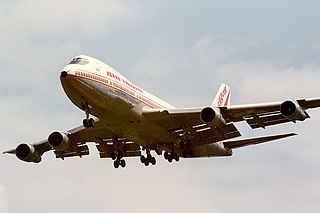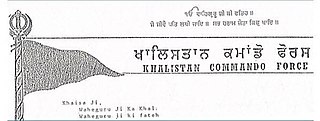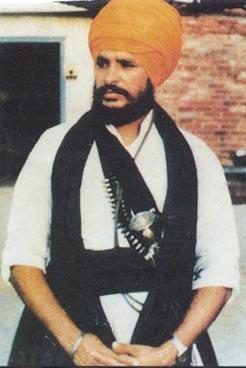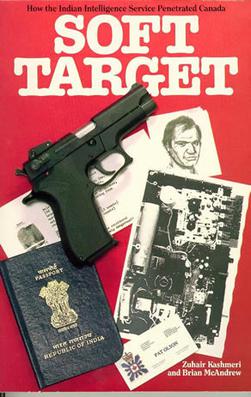Related Research Articles

The Khalistan movement is a separatist movement seeking to create a homeland for Sikhs by establishing an ethno‐religious sovereign state called Khalistan in the Punjab region. The proposed boundaries of Khalistan vary between different groups; some suggest the entirety of the Sikh-majority Indian state of Punjab, while larger claims include Pakistani Punjab and other parts of North India such as Chandigarh, Haryana, and Himachal Pradesh. Shimla and Lahore have been proposed as the capital of Khalistan.

The Canadian Security Intelligence Service is a foreign intelligence service and security agency of the federal government of Canada. It is responsible for gathering, processing, and analyzing national security information from around the world and conducting covert action within Canada and abroad. CSIS reports to the Minister of Public Safety, and is subject to review by the National Security and Intelligence Review Agency.

Air India Flight 182 was a passenger flight operating on the Montreal–London–Delhi–Bombay route, that on 23 June 1985, disintegrated over the Atlantic Ocean as a result of an explosion from a bomb planted by Canadian Sikh terrorists. It was operated using a Boeing 747-237B registered VT-EFO. The incident happened en route from Montreal to London at an altitude of 31,000 feet (9,400 m). The remnants of the aircraft fell into the sea approximately 190 kilometres off the coast of Ireland, killing all 329 people on board, including 268 Canadian citizens, 27 British citizens, and 24 Indian citizens. The bombing of Air India Flight 182 is the worst terrorist attack in Canadian history, the deadliest aviation incident in the history of Air India and was the world's deadliest act of aviation terrorism until the September 11 attacks in 2001. The mastermind behind the bombing was believed to be Inderjit Singh Reyat, a dual British-Canadian national, who pleaded guilty in 2003 and Talwinder Singh Parmar, a Canadian Sikh separatist leader, who was one of the key individuals associated with the militant group Babbar Khalsa.

Babbar Khalsa International, better known as Babbar Khalsa, is a Sikh militant organisation that aims to create an independent Sikh nation of Khalistan in the Indian and Pakistani states of Punjab. It has used armed attacks, assassinations and bombings in aid of that goal, and is deemed to be a terrorist entity by various governments. Besides India, it operates in North America and Europe, including Scandinavia.

The 1985 Narita International Airport bombing was the attempted terrorist bombing of Air India Flight 301, which took place on June 23, 1985. A bomb hidden in a suitcase transiting through New Tokyo International Airport exploded at 06:19 23 June 1985 in a baggage handling room, killing two baggage handlers and injuring another four. The bomb exploded prematurely while the plane was still grounded. The attack at Narita was part of an attempted double-bombing orchestrated by Talwinder Singh Parmar, a Canadian national, and the Sikh terrorist organization, Babbar Khalsa. The bombs were made by Inderjit Singh Reyat.

Talwinder Singh Parmar or Hardev Singh Parmar was a Sikh militant accused by the Indian government of masterminding the 1985 Air India Flight 182 bombing, which killed 329 people. It was the worst single incident of aviation terrorism in history until the September 11 attacks in the United States. In addition, another bomb was meant to explode aboard Air India Flight 301 in Japan the same day, but it exploded while the plane was still grounded, killing two people. Parmar was also the founder, leader, and Jathedar of Babbar Khalsa International (BKI), better known as Babbar Khalsa, a Sikh militant group involved in the Khalistan movement.

The Khalistan Commando Force (KCF) is a Sikh Khalistani militant organisation operating in the state of Punjab, India with prominent members based in Canada, United Kingdom and Pakistan. Its objective is the creation of a Sikh independent state of Khalistan through armed struggle. KCF is also responsible for many assassinations in India, including the 1995 assassination of Punjab Chief Minister Beant Singh. It is designated as a Terrorist Organisation by the Government of India.

The Khalistan Liberation Force (KLF) is a Khalistani separatist militant organization based in the Indian state of Punjab. Its motive is the creation of a sovereign Sikh state called Khalistan via armed struggle. The KLF is one of the key fighting forces of the Khalistan movement. It was responsible for assassinations, abductions and military engagements with the Indian Armed Forces during the Insurgency in Punjab. The KLF is listed as a designated terrorist group by the Republic of India.
Thomas D'Arcy "Ted" Finn was the first director of the Canadian Security Intelligence Service (CSIS), serving from 1984 until 1987. He resigned after it was revealed that CSIS had filed an "inaccurate and misleading" affidavit to acquire a warrant for a wiretap.
Tara Singh Hayer was an Indian-Canadian newspaper publisher and editor who was murdered after his outspoken criticism of fundamentalist violence and terrorism. In particular, he was a key witness in the trial of the Air India Flight 182 bombing.

Jathedar Sukhdev Singh Babbar was the militant and co-leader of Babbar Khalsa (BK), a Sikh militant organisation involved in the pursuit of creating a Sikh nation named as "Khalistan" and generally believed responsible for the 1985 bombing of Air India Flight 182, although Sukhdev was never named as being involved. BK was founded by Talwinder Singh Parmar, himself, and Amarjit Kaur. He commanded BK continuously for 14 years until he was killed in 1992. He was a member of the AKJ.
Mel Deschenes was the director-general of the counter-terrorism branch of the Canadian Security Intelligence Service in 1985 at the time of the Air India bombing. James S. Warren is alternatingly referred to as having held the position of director-general at the same time.

Soft Target: How the Indian Intelligence Service Penetrated Canada is an investigative journalism book written by Canadian reporters Zuhair Kashmeri and Brian McAndrew. The authors define a "soft target" as "an espionage term used for any country, institution or group of people very easy to penetrate and manipulate for subversive purposes" and argue that the Canadian Sikh community was a soft target of a covert operation by the Indian government during the 1980s. The book also makes a claim that Indian intelligence agencies not only penetrated the Sikh community in order to discredit them worldwide and halt the momentum of the demand of an independent Sikh state, but also manipulated the Royal Canadian Mounted Police (RCMP) and Canadian Security Intelligence Service (CSIS).

The International Sikh Youth Federation (ISYF) is a proscribed organisation that aims to establish an independent homeland for the Sikhs called Khalistan. It is banned as a terrorist organisation under Australian, Japanese, Indian, Canadian and American counter-terrorism legislation. The Government of India has declared it a terrorist organisation. While banned, the organization continues to receive financial support from many Sikh people based in Canada, the United States, and the United Kingdom.

Canada–India relations also referred to as Indo-Canadian relations, are the bilateral relations between Canada and India. Canada and India have had longstanding bilateral relations, with shared traditions such as democracy. India has become one of the top source countries for immigration to Canada with Indian diaspora increasing to over one million as of 2022. According to Immigration, Refugees and Citizenship Canada (IRCC) data, of the more than 800,000 international students in Canada in 2022, 40 percent were from India, constituting the largest international student group in Canada. Bilateral trade between India and Canada has seen significant growth in recent years, reaching $8.16 billion in 2023. Both Canada and India are member nations of the Commonwealth association, and also part of G20, a group of world's largest economies.
Bagga is a surname of Punjabi people found in Punjab (India) and Punjab (Pakistan).

World Sikh Organization (WSO) is a Sikh religious and non-profit organization whose 1984 founding goal was "to provide an effective, credible voice to represent Sikh interests on the world stage", after Operation Blue Star. Its stated goal is "to promote and protect the interests of the Sikh Diaspora", and "promote and advocate for" human rights. Tejinder Singh Sidhu currently serves as President of the organization.
Malkiat Singh Sidhu was the former Planning Minister of Punjab, India. He was a member of the Akali Dal political party. In 1986, he was named Minister of State.

Gurjant Singh Budhsinghwala was a Sikh militant and the third Jathedar of the Khalistan Liberation Force. Budhsinghwala's organization, KLF, was one of the most active Sikh militant groups of the time. Budhsinghwala had KLF join the Sohan Singh Panthic Committee and partnered with Khalistan Commando Force (Panjwar), Babbar Khalsa, Bhindranwale Tiger Force (Sangha), and Sikh Student Federation (Bittu) in militant actions. Budhsinghwala is also credited with making KLF one of the strongest and most lethal militant groups.

Harminder Singh Nihang, also known as Harminder Singh Mintoo, was a prominent Sikh militant and the 7th leader of Khalistan Liberation Force. Nihang was instrumental in reinvigorating the Khalistan Movement in the 21st Century. Nihang died in police custody.